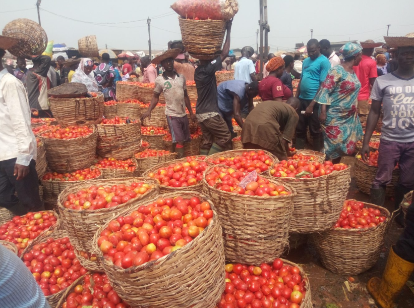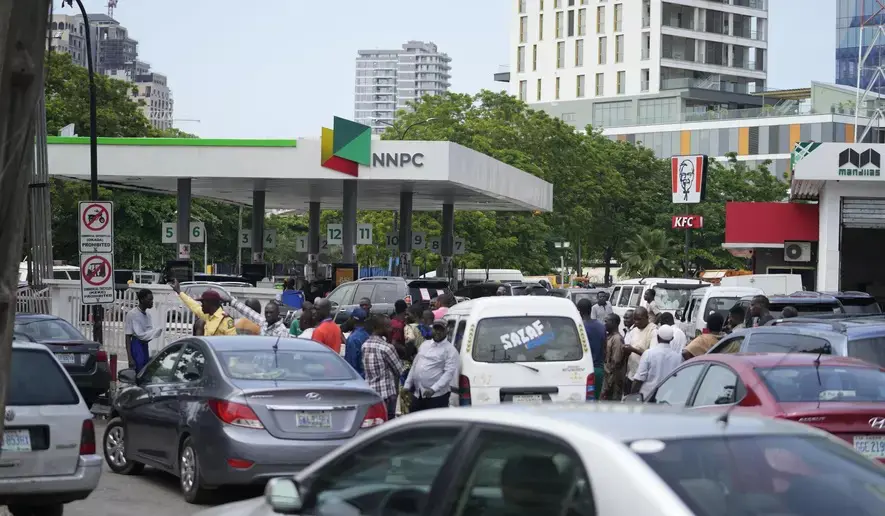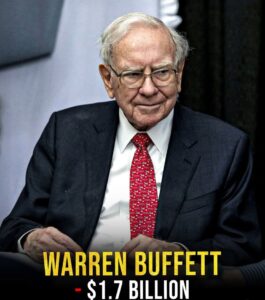Business
Tomato prices crash in Lagos amid harvest season glut
Published
2 months agoon
By
Ekwutos Blog
The price of tomatoes in Lagos and other parts of Nigeria has significantly dropped due to a glut caused by the ongoing harvest season.
Farmers and traders have attributed the price crash to the surplus supply, which occurs annually between January and March.
A tomato glut refers to a situation where an excess harvest of tomatoes leads to a price drop.
According to reports by the News Agency of Nigeria, the price of a 50kg basket of tomatoes now sells for as low as N10,000 to N12,000, depending on the species. In the northern part of the country, a 25kg plastic crate is priced between N6,000 and N7,000.
In Lagos, the price of a big basket of tomatoes has fallen to N13,000–N15,000, compared to the N140,000–N150,000 price range recorded in May 2024. This represents a decrease of approximately 90% over an eight-month period.
The Chairman of the Tomato Growers and Processors Association of Nigeria (Kaduna State Chapter), Mr. Rabiu Zuntu, said the glut is a result of the January-to-March harvest period, during which tomato plants produce an abundance of fruits. This surplus often leads to reduced prices and significant post-harvest losses.
“One of the problems we face in the tomato sector is that the period from January, February, and March is that of tomato glut,” Zuntu explained.
He added that approximately 50% of harvested tomatoes are lost during this period due to inadequate storage facilities and limited processing capabilities.
“Presently, we only have a few functioning tomato processing facilities to help reduce the post-harvest losses we witness annually,” he said.
Urgent need for preservation
Zuntu urged consumers to take advantage of the low prices to stock up and preserve tomatoes for future use.
“We usually advise consumers this period to preserve as much tomatoes as they can to cushion the effect when the produce gets expensive later in the year,” he said.
- He further highlighted small-scale preservation methods that households can adopt, such as blending, boiling, and storing tomatoes in airtight jars, which can last up to six months.
- Another traditional method involves burying tomatoes underground in a humid environment to maintain freshness.
“However, these preservation methods may not be able to work for large-scale preservation and storage of the produce,” Zuntu cautioned.
Vendors confirm price drop
Traders in Lagos also acknowledged the significant price drop. Mrs. Queen Oloyede, a trader at Surulere, noted that a 50kg basket of tomatoes now sells for N15,000–N20,000 at the Mile 12 market.
“Since a week ago, a basket of 50kg tomatoes sells at the Mile 12 market for between N15,000 and N20,000. I advise customers to begin to stock up for the time the produce will be scarce in the market,” Oloyede said.
However, Mrs. Judith Amen pointed out that the highest quality tomatoes still come at a premium price. “Presently, the highest quality of tomatoes at the Mile 12 market sells between N35,000 and N37,000 for a 50kg basket. People should preserve the quantity they can buy,” she advised.
Consumers share challenges
Some consumers expressed concerns about their ability to preserve tomatoes effectively. Mrs. Catherine Eigbedion, a resident of Agege, attributed her limited preservation efforts to an inconsistent electricity supply.
“With tomatoes in surplus this period and at a favorable price, it is advisable to buy in bulk and stock for the scarce days. Not everyone knows the local preservation techniques due to the inconsistent electricity situation. I just buy enough to last me for a week,” Eigbedion said.
Similarly, Mrs. Ebere Dudu from Dopemu emphasized the unpredictability of tomato prices. “We are glad that there are enough fresh tomatoes in the market and they are very affordable. Because we cannot predict the price of tomatoes in the coming months, I buy as much as I can and preserve for the rainy days,” she explained.

You may like


Renowned Bauchi cleric, Abdulaziz Dutsen Tanshi is dead


Tourists lament cancellation of 2025 Eid-el-Fitr Durbar in Kano


Bandits ambush commercial vehicle on Kebbi-Sokoto road, kill passenger


BREAKING: Court bars Akpabio, Natasha Akpoti, and Senate from granting interviews over alleged misconduct case


Anambra Native Doctors in Court: Akwa Ọkụkọ, Eke Hit, and Onyeze Jesus Face Justice


I Will Pay Full Compensation To Families Of 16 Hunters K!lled In Edo State – Governor Okpebholo.
Business
Dangote refinery, NNPC: More fuel stations increase pump price in Nigeria
Published
12 hours agoon
April 4, 2025By
Ekwutos Blog
The price of Premium Motor Spirit, popularly known as fuel, has recorded a significant increase in the past days, which may worsen the economic hardship Nigerians face.
MRS, a filling station partner of Dangote Refinery, kicked off the latest fuel price increase when it adjusted its petrol pump to between N925 and N950 per litre in Lagos and the Federal Capital Territory, Abuja.
Similarly, other fuel marketers such as Empire Energy, Recoil, Juda Oil, Total, Emedab, and others also increased their fuel pump to between N950 and N970 per litre.
On Wednesday, the Nigerian National Petroleum Company Limited retail outlets also jacked up their fuel price to N950 per litre from N880 in Abuja.
Summarily, Ekwutosblog observed motorists will have to pay N70 more to buy a litre of petrol in the coming days.
The development comes amid the suspension of petrol product sales in Naira by Dangote Refinery. This follows the initiation of the naira-for-crude sale deal between Dangote Refinery and the federal government through NNPCL.
On Wednesday, President Bola Ahmed Tinubu announced a reshuffling of NNPCL.
Meanwhile, local oil prices are increasing in Nigeria, despite the decline in global crude prices. As of the time of this report, United States West Texas Intermediate was at $62.15 per barrel, down from above $65, while Brent crude stood at $65.42 per barrel, down from $72 last week.
Business
Global Billionaires’ Net Worth Plummets by $65 Billion Amid Market Downturn
Published
1 day agoon
April 4, 2025By
Ekwutos Blog
In a significant setback, the world’s wealthiest individuals collectively lost over $65 billion in net worth today, as key market sectors experienced a sharp downturn.
This decline affected prominent figures in technology, finance, and other industries, sending shockwaves through financial markets.
Ekwutosblog reports that the downturn occurs amidst cautious optimism that new US policies may not be as severe as initially feared.
However, the immediate impact has already been felt, leading to a decline in the net worth of billionaires such as Elon Musk, Warren Buffett, and Jeff Bezos, amongst others who have significant stakes in tech, finance, and other industries.
The global billionaire population has been growing, with over 2,850 individuals representing almost $15 trillion in wealth.





Despite this growth, the market downturn serves as a reminder of the volatility and risks associated with wealth concentration.
Business
Sterling Bank Makes History: Scraps Transfer Fees for Local Online Transactions, Earns Praise from Lawmakers, Including Mohammed Bello El-Rufai, and the Public
Published
1 day agoon
April 3, 2025By
Ekwutos Blog
Sterling Bank has taken a groundbreaking step to ease the financial burden on Nigerians by eliminating transfer fees and other charges for local online transactions.
This move is a significant stride towards financial inclusion and customer-centric banking, particularly during a time when economic pressures are high.
Ekwutosblog gathered that this initiative has been commended by Mohammed Bello El-Rufai, Chairman of the House Committee on Banking Regulations, who praised Sterling Bank’s commitment to creating a more accessible and equitable banking system.
El-Rufai encouraged other financial institutions to follow Sterling Bank’s example, emphasizing that a competitive banking sector prioritizing Nigerians’ interests will strengthen the economy and rebuild public trust in financial services.
Sterling Bank’s decision to scrap transfer fees is expected to benefit individuals and small business owners who frequently make online transactions. The bank’s customers can now perform local transfers via the mobile app without incurring any charges. Obinna Ukachukwu, Growth Executive at Sterling Bank, stated that access to one’s own money shouldn’t come with a penalty, highlighting the bank’s values-driven approach to customer-centric banking.
This move has sparked widespread public approval, with many calling on other banks to adopt similar policies.
As policymakers, El-Rufai reiterated their commitment to fostering a regulatory environment that encourages pro-customer initiatives while ensuring sustainability within the banking sector.

Anambra 2025: Defections Rocks APC as Party Heavyweights Quit Guber Race

Transfer: I’m yet to decide my future – Osimhen

The 50-year-old code that reshaped the world: Bill Gates on the ‘revolution’ that started Microsoft
Trending

 Trending5 months ago
Trending5 months agoNYA demands release of ‘abducted’ Imo chairman, preaches good governance
- Business5 months ago
US court acquits Air Peace boss, slams Mayfield $4000 fine

 Politics5 months ago
Politics5 months agoMexico’s new president causes concern just weeks before the US elections
- Entertainment5 months ago
Bobrisky transferred from Immigration to FCID, spends night behind bars
- Entertainment5 months ago
Bobrisky falls ill in police custody, rushed to hospital

 Politics5 months ago
Politics5 months agoRussia bans imports of agro-products from Kazakhstan after refusal to join BRICS

 Politics5 months ago
Politics5 months agoPutin invites 20 world leaders
- Politics1 year ago
Nigerian Senate passes Bill seeking the establishment of the South East Development Commission.
